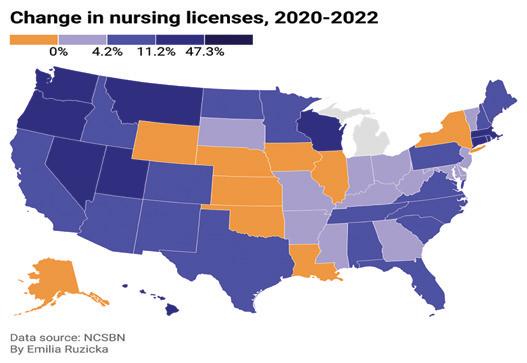
7 minute read
Civil Rights Leaders Express Disappointment and Anger as Supreme Court Strikes Down Affirmative Action
By Sunita Sohrabji
In writing his opinion for the majority, Chief Justice John Roberts left some wiggle room, noting that students could write in their college application essays how racial bias has impacted their lives.
Advertisement
16th Annual Rich States Poor States Report Offers Hope from Policies that Create Opportunity for All
By Dr. Alveda King and Jonathan Williams
In an expected decision, the Supreme Court June 29 struck down affirmative action for college admissions programs at Harvard and the University of North Carolina, saying the practice violated the Constitution’s 14th Amendment by discriminating against white and Asian American students.

But several Asian American organizations, as well as Black and Latino civil rights groups, condemned the decision, immediately mobilizing protests on the steps of the Supreme Court and holding press conferences throughout the day.
And the two Black justices on the Supreme Court, Clarence Thomas and Ketanji Brown Jackson, went head to head with opposing decisions. Jackson recused herself from the Harvard case citing a conflict of interest, but did weigh in on the UNC case. Colorblind?
Thomas argued that the Constitution aims to be colorblind. “Even in the segregated South where I grew up, individuals were not the sum of their skin color. Then as now, not all disparities are based on race,” he said.
“It is no small irony that the judgment the majority hands down today will forestall the end of race-based disparities in this country, making the colorblind world the majority wistfully touts much more difficult to accomplish,” Jackson countered.
“(This decision) will delay the day that every American has an equal opportunity to thrive, regardless of race,” she said, noting that it will only widen socio-economic gaps between white and Black people.
Chief Justice John Roberts, who wrote the majority opinion, left a bit of wiggle room. “Nothing in this opinion should be construed as prohibiting universities from considering an applicant’s discussion of how race affected his or her life, be it through discrimination, inspiration, or otherwise,” he wrote. Some legal analysts have interpreted Roberts’ statement as saying applicants could write in their college essays about how racial bias has impacted their lives, but conceded that this part of the ruling is murky, and will require interpretation.
Students for Fair Admissions
The case was brought about by Students for Fair Admissions, which cheered the Supreme Court decision. Edward Blum, founder and president of Students for Fair Admissions, said in a statement:
“The opinion issued today by the United States Supreme Court marks the beginning of the restoration of the colorblind legal covenant that binds together our multi-racial, multi-ethnic nation.”
“The polarizing, stigmatizing and unfair jurisprudence that allowed colleges and universities to use a student’s race and ethnicity as a factor to admit or reject them has been overruled. Ending racial preferences in college admissions is an outcome that the vast majority of all races and ethnicities will celebrate,” said Blum.
Equal Opportunity
Asian Americans Advancing Justice — Advancing Justice — denounced the decision as an attack on civil rights. “We are outraged that the Supreme Court has chosen to ignore longstanding legal precedent in favor of supporting racial inequity that harms all people of color, including Asian Americans,” said John C. Yang, President and Executive Director of Advancing Justice – AAJC.
“But we are more committed than ever to ensuring equal opportunity for our children – and for all children in this country. We will not let this court decision keep us from pushing colleges and universities, Congress, and others to keep today’s ruling from undermining the progress made toward educating future multiracial, talented leaders who deserve every opportunity to reach their highest potential on campuses that reflect the diversity of America,” he said.
‘Extremist Minority’
The NAACP also condemned the ruling. “Today the Supreme Court has bowed to the personally held beliefs of an extremist minority. We will not allow hate-inspired people in power to turn back the clock and undermine our hard-won victories. The tricks of America’s dark past will not be tolerated,” said NAACP President and CEO Derrick Johnson.
“Affirmative action exists because we cannot rely on colleges, universities, and employers to enact admissions and hiring practices that embrace diversity, equity and inclusion. Race plays an undeniable role in shaping the identities of and quality of life for Black Americans. In a society still scarred by the wounds of racial disparities, the Supreme Court has displayed a willful ignorance of our reality,” said Johnson.
Barriers to Higher Education Aarti Kohli, Executive Director of Advancing Justice – Asian Law Caucus, agreed that the Supreme Court had overlooked the long history and present-day reality of denying Black students equal access to education.
“Racism and anti-Blackness are inescapable in our country, and race-conscious admissions are a crucial tool in expanding opportunities for students of color that reckons with those realities,” said Kohli, noting that the decision will also particularly harm Pacific Islander, Native Hawaiian, and Southeast Asian communities who “continue to face significant barriers to higher education.”
“At a moment when our country is increasingly segregated and there are significant gaps in resources for majority minority schools, we call on Congress, our local elected leaders, and universities to do everything in their power to implement solutions we really need for economic equity and racial justice in our nation,” said Kohli.
MALDEF The Mexican American Legal Defense and Educational Fund said it has long supported raceconscious policies, including affirmative action, “as necessary to address a legacy of racial discrimination and exclusion in higher education.”
“Unfortunately, as expected, a backward- thinking conservative Supreme Court majority today reversed nearly half a century of precedent because of their limited consideration of race,” said MALDEF President and General Counsel Thomas Saenz.
The civil rights leader called for communities and policy makers to “root out systemic and ongoing inequities in the K-12 pipeline, as well as deep research to identify and modify or eliminate all admissions criteria with a demonstrated and unjustified bias and discriminatory effect on students of color, including Latinos, the nation’s largest minority community in the student population.”
While discussing his motivation for lowering state income taxes, Mississippi Speaker of the House Philip Gunn explained, "There is just no downside to putting money back into the pockets of people."

It’s hard to argue with that.
Despite the gridlock in our Nation’s Capital, there is hope across the 50 states for policies that create opportunity for all. The annual report, Rich States, Poor States, includes many examples of states that are getting it right.
For 16 years, the American Legislative Exchange Council (ALEC) has partnered with famed economists Dr. Arthur Laffer and Stephen Moore to produce Rich States, Poor States, an in-depth analysis of each state's economic outlook and performance. The study is a compelling resource for elected leaders deciding whether to embrace policies that increase the size of government or policies that encourage job creation and allow people to keep more of their hard-earned paychecks.
As the nation's largest nonpartisan organization of state legislators dedicated to limited government, free markets, and federalism, ALEC understands and celebrates the role state legislators play when it comes to improving the economic outcomes in their states.
But policymakers are not alone in understanding the value of the report. Entrepreneurs and job creators, for example, regularly use the analysis to identify which states offer the best foundation when starting or moving a business.
Thanks to a pro-taxpayer approach to policymaking, Utah takes the number one ranking in economic outlook for the 16th straight year, with North Carolina and Arizona rounding out the leaderboard for second and third, respectively. All three states boast flat personal income taxes, with rates lower than most states and a recent track record of aggressively reducing tax burdens. As a result, their economies and populations are growing.
Three of the most improved states in the latest rankings were Kentucky, Virginia and Mississippi. Kentucky improved seven spots to 27th overall thanks to its switch to a flat personal income tax in 2019 and commitment to cutting rates in recent years. Virginia is in the midst of an economic comeback, cutting taxes in the 2022 legislative session and climbing an impressive six spots to 18th overall for economic outlook. Under the leadership of Speaker Philip Gunn, Mississippi improved five spots, after passing a flat tax and enacting the largest tax cuts in state history last year.
It comes as no surprise that New York, with its crippling tax rates, overspending, and burdensome regulations, once again claims the dubious distinction of ranking dead last.
Rich States, Poor States notes that the Empire State lost more than 1.7 million residents in the past decade – and more than 300,000 in the past year alone.
New York is joined near the bottom of the rankings by states like California, Illinois and New Jersey that have also experienced a population exodus in recent years. It’s no coincidence that those states impose some of the highest income and property taxes on their residents and regularly rank at the bottom of Rich States, Poor States. Bad policy decisions have consequences.
As report co-author Stephen Moore said, "The action in America is the state capitols. A freedom movement has been unleashed because of Rich States, Poor States. And states are seeing the migration of people, jobs and capital when they get it right."
Let’s hope this movement continues to spread across the states – our 50 laboratories of democracy. While the tax-andspend crowd in Washington, DC pushes bigger government, states that promote economic growth through lower taxes, responsible budgeting, and pro-worker policies will continue to thrive.
Through Alveda King Ministries, Dr. Alveda King shares a message of truth and unity: We are one blood and one human race. Economic freedom, religious freedom and educational freedom will flourish when we accept this truth. Dr. King’s hope for America is rooted in the King family legacy. She smiles at the future of America and believes when peripherals collide, convergence is imminent.
Jonathan Williams is the Chief Economist and Executive Vice President of Policy at the American Legislative Exchange Council (ALEC), where he works with state policymakers, congressional leaders and members of the private sector to develop fiscal policy solutions for the states. Williams founded the ALEC Center for State Fiscal Reform in 2011 and coauthors Rich States, Poor States: ALEC-Laffer Economic State Competitiveness Index with Reagan economist Dr. Arthur Laffer and Stephen Moore.





